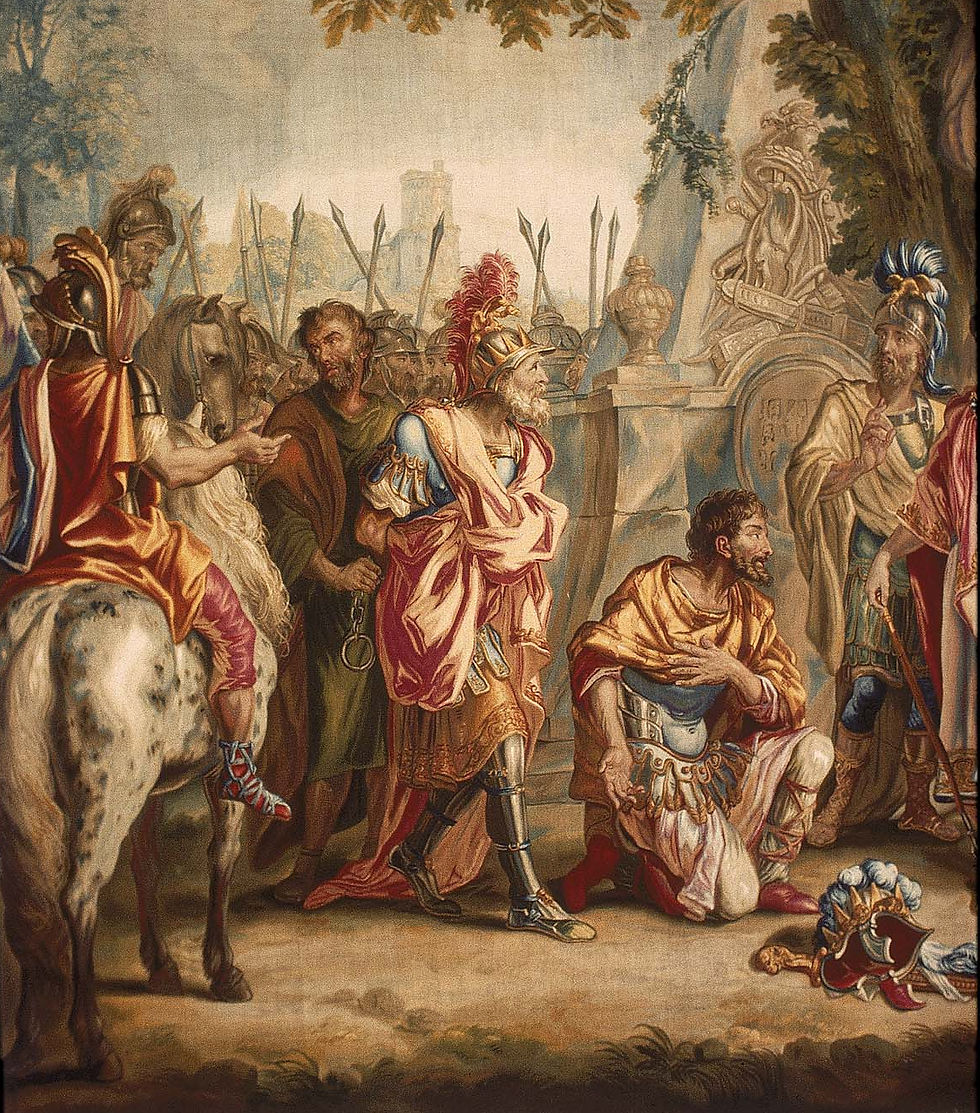Astyages and Harpagus: A Chilling Feast of Revenge According to Herodotus
- nottopsecretpod
- Aug 19, 2023
- 3 min read

While The Not Top Secret Podcast has a focus on the mysterious of the world, goverments, and unexplained, it also has a focus on the bizarre. I have been reading from Herodotus, a Greek historian (484BC-425BC). Herodotus told us the story of a king, who committed an act so bizarre and gruesome, it would cause a global uprising today. The pages of history often unfold tales of power struggles, vengeance, and shocking brutality. The story of Astyages (585 – 550 BC), the last king of Media, and his command to General Harpagus to consume his child's flesh during a feast is a dark and horrifying episode. The ancient Greek historian Herodotus vividly recounts this gruesome event in his "Histories," offering us a disturbing glimpse into a world of ruthless rulers and vengeful generals.

Greek historian Herodotus (484BC-425BC)
According to the ancient Greek historian Herodotus, Astyages experienced a dream in which his daughter Mandane bore a son destined to overthrow his empire. Fearing this prophecy, Astyages arranged Mandane's marriage to Cambyses I of Anšan, a prince described as "quiet and thoughtful," and whom Astyages deemed non-threatening.
When a subsequent dream warned Astyages about the potential danger from Mandane's child, he dispatched his general Harpagus to eliminate the infant Cyrus.
Harpagus, reluctant to spill royal blood, gave the baby to a shepherd named Mitridates, ordering him to eliminate the child. Mitridates, whose wife had recently given birth to a stillborn child, instead swaps the royal baby's clothing onto the stillborn and returns the deceased infant to Harpagus claiming to have carried out his orders.
Cyrus grew up as Mitridates' own son, and Harpagus presented the lifeless stillborn child to Astyages, claiming it was Cyrus. When Cyrus was discovered alive at the age of ten, Astyages spared him upon the counsel of his Magi advisors, reuniting him with his parents in Anshan. Nevertheless, Harpagus faced retribution; legend tells that Astyages made him unwittingly consume his own son during a banquet.
The Alarming Order:
The tale begins with King Astyages' command to General Harpagus to avenge himself for an act of disobedience. Herodotus recounts this chilling order: "Astyages cut up his son, roasted the flesh and cooked it; he then invited Harpagus and a few other men to a feast." In a twisted act of revenge, Astyages forced Harpagus to partake in a meal prepared from his own son's flesh.
Harpagus' Fateful Feast:
At the gruesome feast, Harpagus was unknowingly served his own son's flesh. Herodotus paints a haunting picture: "When they had finished eating the meat, Astyages asked Harpagus how he had enjoyed the meal." Unaware of the sinister truth, Harpagus praised the taste of the meal. Only then did Astyages reveal the horrifying secret, informing Harpagus of the truth behind the feast.
Harpagus' Stoic Reaction:
In the face of this shocking revelation, Harpagus exhibited remarkable composure. Herodotus narrates: "Astyages ordered Harpagus to be shown the remains of his son and the various other parts of the body." Harpagus, rather than succumbing to emotional turmoil, maintained his outward calm, determined to control his reaction and protect his life.
The Unveiling of Astyages' Brutality:
Astyages' cruel act was a stark testament to his unrelenting thirst for vengeance. In Herodotus' words: "He asked him [Harpagus] whether he had recognized the meat." Harpagus, in his response, feigned ignorance and replied that he had no way of knowing. Astyages then revealed the truth, plunging Harpagus into a realm of horror and despair.
Harpagus' Hidden Revenge:
Harpagus, although seemingly controlled in the king's presence, harbored a secret desire for retaliation. This desire would eventually lead to his alliance with Cyrus the Great and the downfall of Astyages' rule. Herodotus notes: "He [Harpagus] made no sign of distress but replied that whatever the king did was right." This composed response masked Harpagus' burning desire for vengeance. Cyrus would eventually help re-enter the great civilization making a move away from brutal acts of revenge and torture.

King Sstyagus after the successful revolt by his grand son Cyrus.

Harpagus looking on as Astyages is led away in shackles.
Cyrus spared Astyages, and despite Harpagus' taunts, Herodotus states that Astyages was treated well and remained in Cyrus' court until he passed away.

Conclusion:
The story of Astyages and Harpagus, as told by Herodotus, presents a disturbing portrayal of power dynamics, cruelty, and calculated revenge. The image of Harpagus consuming his own son's flesh in a morbid feast serves as a haunting reminder of the depths to which rulers would sink to assert their dominance and exact retribution. This dark tale offers a chilling glimpse into the psychology of power and the complex interplay between loyalty, fear, and the quest for revenge in the ancient world.
(In the Biblical book of David (chp 14), the story of Astyages is mentioned with the accension of Cyrus to the throne. Astyages is named as Darius the mede)

Comments